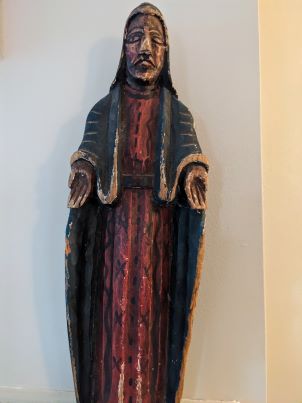What’s in a name? When it comes to virtues, quite a bit.

There’s a tradition of so-called virtue names — like Hope, Patience, Grace, Faith, Joy, Comfort, Prudence, Constance, Charity, Valor, Honor, and Justice — that proclaim aspirational qualities. I love these old-fashioned monikers, even though naming an individual for an estimable trait risks lifelong burden.
To live up to the nominal virtue of one’s name will surely be challenging at times. The name may even prove to be a significant misnomer, not in accord with the individual’s personality at all. But such complicated reservations weren’t on my mind in the anticipatory days when we were pondering our impending children and poring over a secondhand copy of 4,000 Names for Your Baby. Several virtue names made it onto our initial lists, maybe one or two onto the shortlist. Still, for whatever reason, we never chose virtue names for our three kids.
There’ve been no babies to name for more than 30 years here, but among the pleasures of writing fiction is the naming of characters. I still pull out that shabby paperback. As an author, I’m a creator, not a parent — a different relationship, a different responsibility. I don’t hesitate to use the occasional virtue name in my work.
So, in one story, I have a Joy. Not very joyful, the attribute contrary to her temperament, but that dissonance is part of her narrative and development. Two of my characters are named Grace, one in a story, one in a novel. They are quite different from each other — in fiction as in life, no one is defined by her name. The duplicate name was unintentional. Like the old woman in the shoe who had so many children she didn’t know what to do, an author (or this author, anyway) gets forgetful.
A virtue name I never considered bestowing on either a child or character is Mercy. Why not? Or, as my beloved maternal grandmother, Esther, would say, “Whyever not?” Well, perhaps because Mercy is associated in my mind’s ear with Grandma Esther’s signature Missouri farm-girl exclamations. “Mercy me!” she’d say, surprised. “Oh, merciful heavens,” she’d sigh, dismayed. And often, short and to the point, exasperated, “Oh, mercy.”
The way Grandma spoke delighted and amused me, my brother, and our cousins. We imitated her expressions in our play, and she had the forbearance to laugh.
Oh, mercy.
Yet “mercy” reverberates with solemnity now in my mind’s ear since the Interfaith Service of Prayer for the Nation at the National Cathedral. Bishop Marianne Edgar Budde of the Episcopal Diocese of Washington welcomed newly inaugurated President Trump and the attendant dignitaries, as well as all those listening online, and preached in support of “Unity that serves the common good.”
Concluding her brief, powerful homily, a small woman looking down from the imposing pulpit where Martin Luther King preached a week before he was assassinated, Budde addressed the president directly. “Have mercy,” she implored him, “to the people in our country who are scared now.” Be merciful, she exhorted him, to those who fear for their own or loved ones’ safety and security, fear for their lives, fear persecution, fear deportation. The faint shadow of tension in her voice only underscored her courage and integrity.
The bishop urged all of us listeners as well — every imperfect one of us — not just to pray but to act. To act to honor “the dignity of every human being…for the good of all people and the world.” To act in accord with mercy.
In the continuing turbulence and frequent darkness of these days, and with the prospect of further difficult times to come, I consider her call to merciful action. The dictionary on my shelf (American Heritage, third edition) defines mercy first as “compassionate treatment, especially of those under one’s power.” Next as “a disposition to be kind and forgiving,” and then as “something for which to be thankful, a blessing.” And finally as “alleviation of distress, relief.” All these definitions are timely and relevant. To practice mercy, Bishop Budde reminds us, is not just aspirational but imperative, a requisite of a moral life.
Mercy is also, as she said, a fundamental requirement of just leadership. Today, I turn to Portia’s speech in The Merchant of Venice. She, too, exhorts her listener to do the right and just thing. The quality of mercy, she says, “It is twice blest;/It blesseth him that gives and him that takes:/‘Tis mightiest in the mightiest…”
‘Tis mightiest in the mightiest.
Considering mercy, I also reconsider Mercy as a name. I hope future census data will show a surge in its popularity starting here and now in 2025. And that history will show that those so named so acted. Meanwhile, and going forward, in accord with another colloquial expression, those of us who are not mighty must nonetheless act as though Mercy is our middle name.
Ellen Prentiss Campbell’s collection of love stories is Known By Heart. Her story collection Contents Under Pressure was nominated for the National Book Award, and her debut novel, The Bowl with Gold Seams, won the Indy Excellence Award for Historical Fiction. Her novel Frieda’s Song was a finalist for the Next Generation Indie Book Award, Historical Fiction. Her column, “Girl Writing,” appears in the Independent bi-monthly. For many years, Campbell practiced psychotherapy. She lives in Washington, DC, and is at work on another novel.
